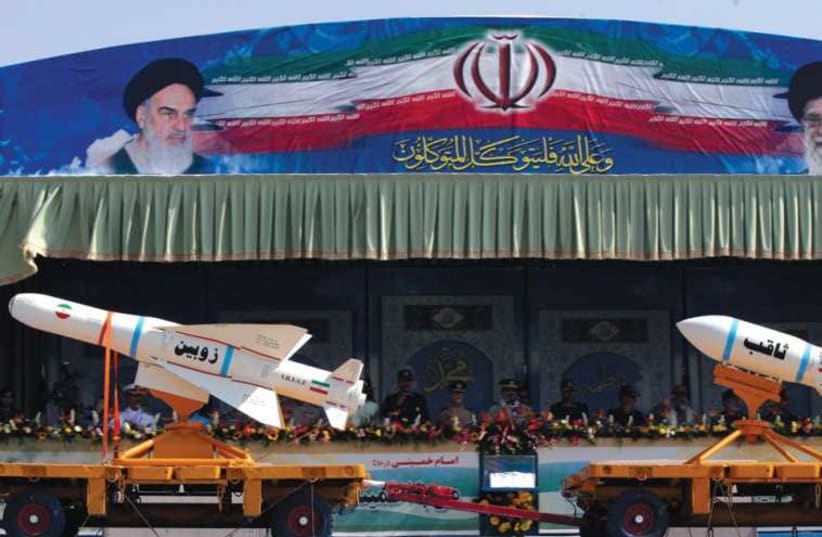See the latest opinion pieces on our page
Henry Kissinger in his book World Order describes Iran as a state which has deliberately placed itself outside of the liberal world order, struggling to “decide whether it is a country or a cause.” Therefore, even though, as the president argues, the nuclear issue should be the only object of the agreement, the real point is not the bomb itself but the hand on the launch button.Rabbi Eric Yoffie, former head of the American Reform Movement and one of America’s most liberal Jewish leaders as well as, by his own avowal, a “confirmed Obama admirer,” expressed his criticism of the deal as follows: “After years of Iran-watching, they [American Jews] know that Iran is an Israel-hating, Holocaust- denying theocracy, the patron of Hezbollah and other radical groups that are in the business of killing Jews. From our long history, Jews are aware that such things matter; when in doubt about whether to trust virulently anti-Semitic nations and leaders, the general rule is: Don’t!”This, precisely, is the point which Israel makes: Obama’s rejection of the demand that Iran should be required to recognize Israel as part of a final nuclear deal gave the ayatollahs the (admittedly false) message that they can continue doing what they’re doing from Iraq to Yemen and beyond, instigating and promoting terrorism wherever they can, threatening the Jews with destruction, etc., while the US closes its eyes to all their misdeeds so as to establish a partnership with the aim of “stabilizing” the Middle East.Former CIA Iran analyst Reuel Gerecht has observed that a nuclear accord with Iran may be all that is left of Obama’s dream to transform the world – but that Obama “has misjudged Iran’s supreme leader, [Ali] Khamenei, and its president [Hassan] Rouhani.”Transforming the politics of the Middle East under the aegis of a nuclear Iran cannot but sound ludicrous to anyone living in the region – or acquainted with recent history.Some observers had predicted already at the outset of his first term that President Obama would envision a grand strategic shift in which Iran turns from enemy of the US to a regional partner. Actually he had hinted as much when he said in 2013, after the first nuclear interim deal with Tehran, that it meant more than “uranium stockpiles and centrifuge counts.”One wonders what Winston Churchill’s or FDR’s reaction would have been to a suggestion to “remake” the world in tandem with the Third Reich (actually there was such a suggestion – only to be immediately dismissed by Churchill).Former US undersecretary of state Nicholas Burns, while not completely negative, stipulates that Obama must now “shore up America’s base of power in the Middle East with Israel and America’s Arab partners, notably Saudi Arabia, remarking that the deal with Iran does not end the decades-long struggle for power with a willful and often untrustworthy Iranian government. In many ways, that struggle has just begun.”Retired US General David Petraeus, the commander of the “surge” in Iraq and still closely following developments in the Middle East, is more outspoken: “The current Iranian regime is not our ally in the Middle East. It is ultimately part of the problem, not the solution. The more the Iranians are seen to be dominating the region, our interests generally diverge...Iranian power in the Middle East is foremost problematic because it is deeply hostile to us and our friends.”Perhaps the most important voice raised against the framework agreement with Iran was last week’s joint op-ed by former secretaries of state Henry Kissinger and George Shultz in The Wall Street Journal. While diplomatically bending over backwards to find some merit in President Obama’s policies, they convincingly argue that not only does the above agreement effectively concede any option of using military force to compel Iranian compliance, and also point out that the Iranian program and procedure has reached a point “officially described as being within two to three months of building a nuclear weapon.”The two former top US diplomats are equally doubtful about the effectiveness of the verification mechanism called for in the deal; the mechanism is political, i.e. dependent on Iran’s willingness to comply with it. They also cite Tehran’s ongoing non-compliance with previous inspections resolutions. They conclude: “The gradual expiration of the framework agreement, beginning in a decade, will enable Iran to become a significant nuclear, industrial and military power after that time...Iran will be in a position to bolster its advanced nuclear technology during the period of the agreement...after the agreement expires or is broken.”All this will lead, as they explain, to Iran’s neighbors seeing the agreement as “a dangerous prelude to an even more dangerous permanent fact of life,” and viewing the US “as willing to concede a nuclear military capability to the country they consider their principal threat.” The op-ed also refers to President Obama’s expressed desire to forge a regional partnership with Iran and asks, “Partnership in what task?” adding that cooperation is not an exercise in good feeling, it presupposes congruent definitions of stability. “There exists no current evidence that Iran and the US are remotely near such an understanding,” they write.In spite of President Obama’s errant reasoning, his good intentions are not in doubt. But caveat emptor: it will be his responsibility to see that the agreement won’t be the free pass it now looks to be for Iran to continue its mischief and remain the threat to the world it is.The author is a former ambassador to the US.
Message to Obama on Iran: ‘Caveat emptor’
As the president admitted, the best one can now hope for is that Iran won’t get get a bomb “on his watch.”
